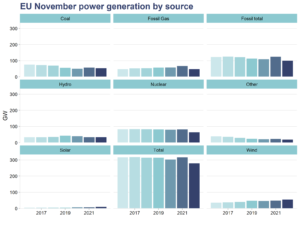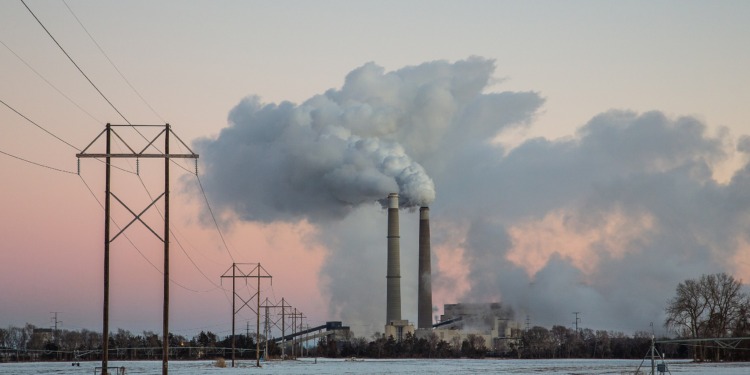Last month, the European Union (EU) produced less CO2 than it has done in November for the past 30 years. A new three-decade low was also reached for gas consumption, power sector CO2 emissions, and power generation from fossil fuels.
These statistics, based on CREA’s near-real-time tracking of EU CO2 emissions, contradict the widespread expectations that the fossil fuel crisis, which escalated earlier this year following Russia’s invasion of Ukraine, would result in an increase in the bloc’s emissions.
This drop in greenhouse gases (GHGs) is said by Lauri Myllyvirta, lead analyst at CREA, to have been caused in large part by a combination of two factors:
- The impact that high energy prices have had on reducing levels of demand.
- The record wind and solar output that has been observed since March 2022 in 19 EU member states.
The unusually mild weather also played a role in the reduced demand for energy, however this is a far smaller factor than may be expected, accounting for only around one-third of the lowered demand whilst higher prices claimed the majority.
As well as forming a key contributing factor to these lowered emissions, the high fossil fuel prices are also encouraging a dramatic acceleration in investments in clean energy and energy efficiency, which will doubtlessly play a major role in emissions reduction over time.
📢NEW
⚠️🇪🇺EU CO2 emissions hit 30-year low in Nov. 2022Nov. 2022 EU values lowest in some 30 years for:
✅Total CO2 emissions
✅Gas consumption
✅Power sector CO2 emissions
✅Fossil fuel power generationSee analysis & CREA EU CO2 emissions tracker 👇 https://t.co/6r9IBkDYHX
— Centre for Research on Energy and Clean Air (@CREACleanAir) December 23, 2022
Within the EU, Spain, Belgium, and Italy all demonstrated significant increases in renewable power generation as well as stark decreases in levels of total energy demand.
This resulted in a reduction in fossil fuel use this November, compared to November 2021, of around three times for Spain, 1.5 times for Belgium, and five times for Italy.
Related Articles: A Record Year for Solar Power in Europe: Is Our Renewable Energy Future Closer Than Expected? | Cutting Emissions: Can The Rich Pay the Poor To Do it On Their Behalf?
France and Germany demonstrated dramatic reductions in nuclear output, with wind power supplementing this energy need to a far greater extent in both nations this November compared to last November.
The Czech Republic, Poland, Finland, Sweden, and the Netherlands did not show an increase in clean power generation. However, the reduction in overall energy demand resulted in these nations consuming less fossil fuels and producing fewer CO2 emissions than they did in November 2021 regardless.
How sustainable is this lowered CO2 emissions rate?
As Lauri Myllyvirta says, “everything is conditional on the weather. If we have a big cold spell, we will see more gas burning,” so it will likely be the case that, should temperatures drop again, these impressive statistics will falter.
However, it is certainly still possible that CO2 emissions will remain lower than is typical for the time of year given the results that December has produced so far.
Despite the drop in temperatures this December compared to December 2021, the month’s total emissions remain below their 2021 level, suggesting that the high gas prices are continuing to drive demand down.
Though this is positive in terms of our GHG emissions, there are obvious concerns produced regarding how the vulnerable members of society are being impacted by the combination of cold weather and energy prices that are above their means.
To this end, Myllyvirta has urged governments to manage the transition away from fossil fuels equitably, to ensure the dangerous social and economic impacts of this shift are minimised.

How is the rest of the world faring?
Coal use around the world is set to reach a new record this year, according to the International Energy Agency, in a disappointing though perhaps unsurprising contrast to the EU’s positive news.
It seems unlikely that this will see any change in the near future as China, the world’s largest consumer of coal, recently reported that it plans to boost production through 2025 to prevent last year’s power shortages from recurring.
This attitude is certainly not visible everywhere outside the EU though, as South Africa, Indonesia, and Vietnam have recently signed investment agreements with wealthy partner countries that will help them speed up their shift towards renewables.
Though global progress is moving at a slower pace than that within the EU, the bloc’s improvements can serve as an example of what is achievable in terms of addressing climate change within a short space of time.
As Myllyvirta says, “if anyone had said a year ago that Europe could nearly eliminate reliance on Russian fossil fuels in 10 months, they would have been taken for a complete lunatic, but we have come quite close to doing so, and that is quite remarkable.”
Editor’s Note: The opinions expressed here by the authors are their own, not those of Impakter.com — In the Featured Photo: Sherco Generating Station. Featured Photo Credit: Wikimedia Commons.










